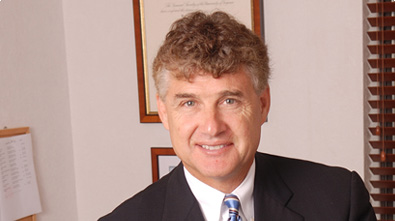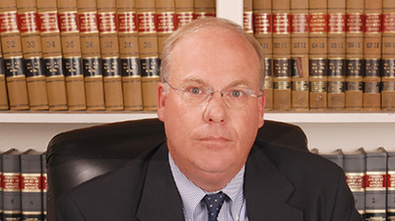By Martha Finan
Attorney Gregory S. Larsen is part Greek, part Norwegian, and all trial lawyer. He is a partner in Roy, Larsen, Romm, and Lascara, a full service general law firm in which each attorney focuses on specialized area of law. We meet just after his return from a Florida vacation which included daughters, Erin and Hailee and parents Leon and Dora Larsen, both of whom are retired professors. Though clearly tired after his first day back in the saddle, he wears the peaceful look of a man still hearing the surf. He smiles easily, his pleasant tanned face breaking into laugh lines, his rumpled curly hair underlining his Mediterranean ancestry. But as the conversation progresses from vacations to individual rights, Gregory Larsen’s Pose changes like lightening from languid to attack mode. The observer tenses, realizing that she has awakened a panther from his nap. Here would be a formidable foe in the courtroom.
Asked what led him to pursue a career in law, he responds that he has always been predisposed to root for the underdog. “Standing up for the little guy, for what’s right; that was instilled in me by my parents,” he reflects. “Plus, from the tenth grade on, I felt that law would challenge me constantly.”
Gregory contends that few people realize how difficult it is to take on big business. Having worked the last 18 years as the principal trial lawyer at Roy, Larsen, Romm, and Lascara, he has had ample opportunity to observe the difficulties of David facing Goliath. He has tried numerous civil jury cases concerning product liability, medical malpractice, and personal injury all around the state. Notwithstanding America’s much-touted rights for the individual, Gregory contends that the individual is often disadvantaged when a dispute arises between an injured party and, for example, the medical industry or the insurance industry. “The big defendant has markedly greater resources, more money to hire experts,” he asserts.
As an attorney, Gregory has the opportunity to make a difference; not just for the parties involved in the litigation, but sometimes for society at large. He is proud of a case which involved a defective crutch being used by a client after his release from the hospital following knee surgery. The crutches broke under the patient, permanently compromising his vulnerable knee. “My client was unable to return to work after his fall,” Gregory recounted. “We sued the crutch manufacturer who, we learned, has never employed an engineer or similar professional to test the crutch. Believe it or not, the president of the corporation stated the he personally tested the crutch his company manufactured – by smashing it against his office walls! Since it didn’t break, he considered it suitable for the marketplace. Worst of all, when the crutches failed, the corporation insisted that the individuals must have broken the crutches.”
After a six-date jury trial in Norfolk Circuit Court in which Gregory presented the testimony of a structural engineer and of a woman who had been injured on crutches by the same manufacturer, the jury ruled in favor of the injured man and awarded the damage requested. “Best of all,” Gregory concludes, “we were able to get the Food and Drug Administration involved. That particular crutch is now off the market.”
If lawyers had not become involved in that case, the company probably would still be making defective crutches, Gregory says. “Who knows how many other patients would have been injured before somebody accepted responsibility? I firmly believe that many times an attorney is the last best hope for rectifying an injustice in our society.”
This attorney does not believe in beating war drums, in encouraging clients to sue when it’s not clear that the other party is at fault or that his client’s injury should have been prevented. “Much of our cynicism toward the system in a civil context results when some attorneys cross that line,” he says.
This leads to the delicate question: why are American’s so cynical about lawyers? Partly because some attorneys don’t have their hearts in the practice of law, Gregory suspects. Recalling his days in law school at William and Mary, he reflects, “Some students really didn’t want to be there. They seemed motivated by money, prestige or both. When I speak to students at career days, I say, ‘You’ll probably spend about half of your waking hours at your job. It makes sense to pursue a vocation that excites and interests you. “‘
Gregory praises his associates at Roy, Larsen, Romm, & Lascara for their ethical and balanced approach to law. That’s the overriding reason he’s still with the firm. “When they were kind enough to hire me fresh out of law school 18 years ago, I figured this would be a good place to get experience; then maybe I’d move on in a year or so,” Gregory reflects. “But I’ve had the good fortune to have partners I’ve enjoyed as people.”
He leans back in his chair, analyzing the firm’s history. “Jim Roy has clients who called him once 20 years ago, and they still consider him their lawyer,” he marvels. They haven’t forgotten Jim’s honesty, his fairness. Even though it has been a long time since they used our services, you can bet this is the firm they’ll call next time they need a lawyer. People remember.”
He ponders his own contributions to the firm. “I hope my clients know that I really cared about their particular situations and tried to present their cases strongly and fairly.”
Finan, Martha. “At Roy, Larsen, Romm& Lascara- Gregory Larsen Defends the Little Guy, Tackles Corporate Bullies.” The Shopper May 2002, Great Bridge/Moyock Ed.: 30.



